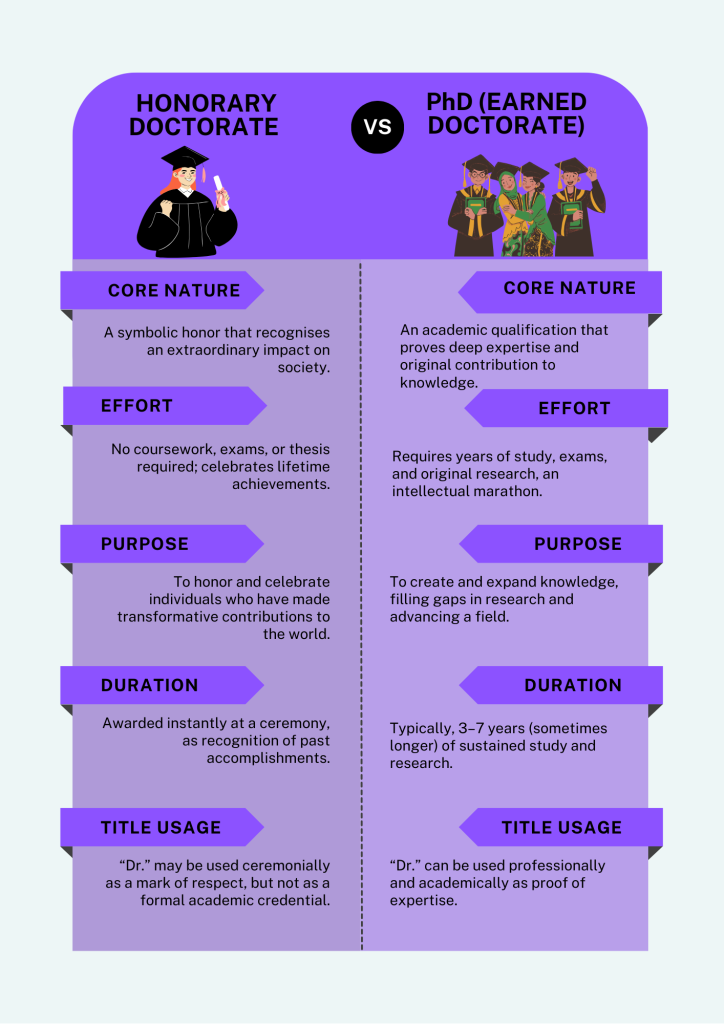Do you know the real story behind the ‘Doctor’ title? Is it years of gruelling study, or might it also signify a person honored for their extraordinary societal footprint? All doctorates are unique. The fascinating doctoral world has two paths: the earned doctorate, built on deep research, and the Honorary Doctorate, recognizing extraordinary impact in the real world. Both command respect, but their paths, purposes, and prestige differ. Understanding this distinction is important for students aspiring to enter academia, for professionals curious about credentials, and anyone intrigued by the “Dr.” title in society.

This guide will clarify what each degree entails, the criteria for awarding them, their significance, and the ways they impact both individual careers and society. We will explain at large. At the end of the blog, you will find the difference is simple yet powerful:
With a PhD, you are showing the world, ‘Look, I have mastered this subject.’ With an Honorary Doctorate, the world is showing you, ‘We see your impact, and we want to honor it.’
What is an Honorary Doctorate?

An Honorary Doctorate is one of the highest recognition a university can bestow. A university may present a prestigious award to honor the remarkable achievements of an individual’s extraordinary impact within a profession or on society as a whole. The term Honorary Doctorate is often used interchangeably with an Honorary PhD Degree.
The very first Honorary Doctorate was awarded by Oxford University to Lionel Woodville in 1478. He was recognised with the title of Doctor of Canon Law (DCL), specifically acknowledging his considerable influence and connections.
The uniqueness of an Honorary Doctorate is that the university celebrates the meaningful contributions and accomplishments you’ve made over the years in your life.
It is not earned through textbooks or exams. Honorary Doctorate can be awarded to artists, philanthropists, businessmen or people whose work made a significant difference in community service.
It is presented during grand university ceremonies to give tributes to the receiver in a public celebration.
As we all know, Honorary Doctorates are special honors given to extraordinary people. Nelson Mandela received so many Honorary Doctorate degrees for his leadership, and Dr. A.P.J. Abdul Kalam, India’s former beloved president, received an honor for his contributions in the field of science.
What is an Earned Doctorate (a PhD Degree)?

In contrast, an Earned Doctorate or the PhD (Doctor of Philosophy) is a recognised standard in higher education that demonstrates expertise in a chosen discipline.
It is a Backbreaking, years-long marathon that you run to prove your mastery of a specific academic field. This is for the person who isn’t content with just knowing a lot; they want to contribute something truly new to the human conversation. The journey begins with a solid academic foundation.
You can’t start this race without a bachelor’s and usually a master’s degree already in hand. From there, you immerse yourself in advanced coursework, preparing you for the main event: original research. It is a deep dive into your subject, where you are discovering something that no one has ever discovered before.
For 3 to 7 years, you are a scientific detective, a historical excavator, or a literary pioneer. The grand finale is the dissertation, a magnum opus that compiles all of your original findings and arguments.
This isn’t just a book you write; it’s the physical proof of your intellectual journey.
Then you face a dissertation defence as a final step of your earned doctorate journey. Here, you face the team of experts in your field and confidently defend your work. That’s when you finally earn the title of Doctor.
PhD vs. Honorary Doctorate: At a Glance

1. Core Nature: Your Brain’s Marathon vs. A Lifetime Achievement Award
- PhD (Earned Doctorate): A demonstration of your skills and expertise. This academic degree reflects years of rigorous intellectual work and demonstrates your ability to discover new knowledge and contribute original ideas. It’s a statement about your academic capability
- Honorary Doctorate: Granted by a university as a medal of honor. It is not about what you have learned in their classrooms but about the meaningful impact you’ve already had on society with dedication to your profession.
2. Effort: Building Knowledge Brick by Brick vs. Celebrating a Life Well-Lived
- PhD (Earned Doctorate): This degree requires years of deep study, extensive coursework, and original research for a dissertation defence. The journey is all about working like a researcher, asking questions about everything, testing ideas, and working tirelessly to leave your footprint on the world of knowledge.
- Honorary Doctorate: A completely different path to walk. It does not require academic coursework, exams, or research. You don’t “study” for it. Receiving an honor for recognition for your impactful career and your leadership in your life over many years.
3. Purpose: Challenging the Unknown vs. Applauding Real-World Influence
- PhD (Earned Doctorate): The main purpose of a PhD is to learn, create, and share knowledge in your field. You are like a detective of ideas, uncovering missing information about unanswered questions via research.
- Honorary Doctorate: This celebration is about the positive transformation created by someone in their society, industry, or the whole world. This is how universities salute their honorees.
4. Duration: The Long Haul vs. The Momentous Ceremony
- PhD (Earned Doctorate): It is about investing a significant chunk of your life into becoming a master of your craft. spans 3 to 7 years of study, deep research, and intensive writing, all aimed at building truly deep expertise and creating something genuinely original.
- Honorary Doctorate: In stark contrast, an honorary doctorate is about instant recognition. The university awards it in a single, momentous ceremony, not for the future work but for the achievements of life.
5. Title Usage: “Dr.” You Earn vs. “Dr.” You are Honored With
- PhD (Earned Doctorate): You can use the “Dr.” title with confidence in a professional and academic environment. Reflecting your expertise and the years of dedication behind it.
- Honorary Doctorate: While the ‘Dr.’ title from an honorary doctorate is more about paying tribute to a lifetime of achievement in a respectful manner than qualification.
Best Institutes For Earned Doctorate and Honorary Doctorate –

If you are looking for an Earned Doctorate or receiving an Honorary Doctorate Degree Dunster Business School and Florida Institute of Science and Management (FLISM) are the best options for institutes to consider. These schools are like treasure chests of knowledge, offering a huge variety of online PhD and doctoral programs in areas such as Entrepreneurship, Innovation Management, Business & Management, Finance, and more. Plus, they have Specializations in Digital Marketing & Branding, and Financial Management. They arm you with the right tools and strategies to dominate in today’s competitive world.

Both DBS and FLISM also celebrate amazing individuals by conferring honorary doctorates to individuals who have made outstanding contributions in business, education, innovation, social development, or humanitarian work. It’s a careful process, with nominations thoroughly checked by a committee and given a final nod by the senate or academic council. Then, in a special convocation ceremony, the university formally recognizes these remarkable achievements. Choosing either DBS or FLISM means you are not just getting a great education; you are plugging into a global network of leaders and innovators.
Conclusion
The world respects both Honorary Doctorates and Earned Doctorates, but they recognize different milestones. A PhD reflects a significant investment of time and effort in research. An Honorary Doctorate Degree is all about recognition of exceptional contributions and leadership of the people who have shaped communities and inspired change through their actions. Schools like Dunster Business School and FLISM show how these degrees benefit individuals and society. Always remember, Success does not depend on the title after your name, but in the legacy you build through your actions.
FAQs
Ans: Yes, prestigious institutions never charge participants for an honorary doctorate.
Ans: No. An earned doctorate requires academic enrollment.
Ans: Honorary doctorates have been awarded to many leaders, such as Nelson Mandela, Oprah Winfrey, Dr. A.P.J. Abdul Kalam, J.K. Rowling, Ratan Tata, Lata Mangeshkar, and Sachin Tendulkar.
Ans: There are no limits to the number of honorary doctorate degrees an individual can receive.
Ans: Generally, no. Teaching or research positions require an earned doctorate.


Well said and very educative
Beautiful explanation Prof.
Great!
It’s empirically and explicitly argued: the comparatively analysis of the earned PhD and honour Doctorate- (Title Usage: “Dr.” You Earn vs. “Dr.” You are Honored With
PhD (Earned Doctorate).
👍📚
Great!
It’s empirically and explicitly argued: the comparative analysis of the earned PhD and honour Doctorate- (Title Usage: “Dr.” You Earn vs. “Dr.” You are Honored With
PhD (Earned Doctorate).
👍📚
Good job.
Great post! Now the distinction finally makes sense.
Can anyone earn more than one doctorate degree in different disciplines or field of science?
Yes, it’s possible to earn more than one doctorate in different fields depending on someone’s passion and dedication.
But honestly, it’s rare and extremely demanding.
What a great difference.
Pingback: What is an Honorary Doctorate? (Honoris causa)
Both doctorates are important, but the earned doctorate is crucial and more important in the academic world. Again, the earned doctorate, can be earned at any age, post confidence to the person who has earned it, unlike the donated one.
Well explained
হাই, আমি আপনার মূল্য জানতে চেয়েছিলাম.
It has been explicitly stated what difference is there in Honorary Doctorate and earned PhD degrees.
Honorary Doctorate is what is also known as Honoris Causa.
Aloha, makemake wau eʻike i kāu kumukūʻai.